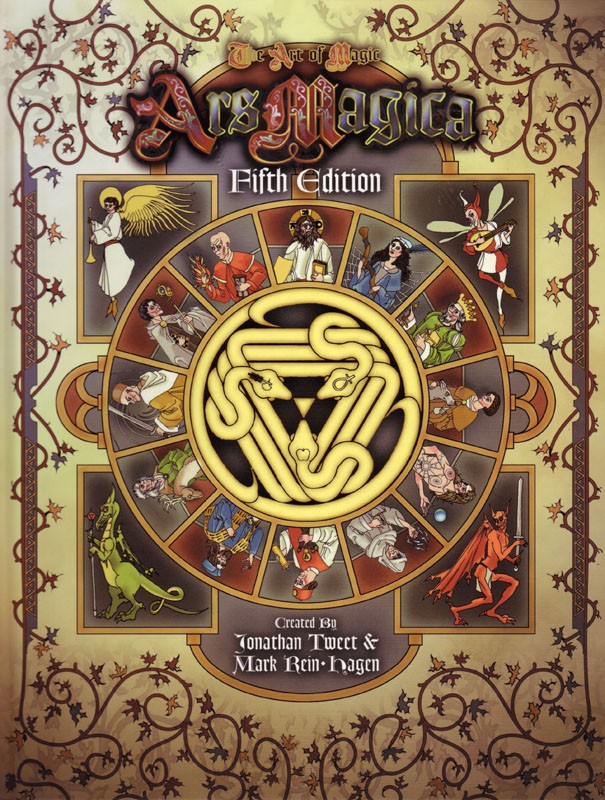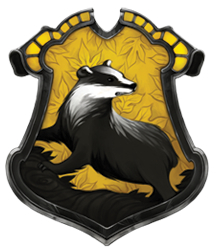Not gonna happen, Ancient History is busy on other stuff. I'll try to be team nostalgia and team rage.virgil wrote:I'd love to see Ancient History and Frank throw down and review the Ars Magica 5E core book, since it's about 10 years old now
OSSR: Ars Magica
5th Edition

Yes, that Jonathan Tweet and that Mark Rein • Hagen. Sort of.
OK, for Ars Magica 5th edition we have to start at the fucking cover, because that's where the weirdness starts. This book proudly states that is is “Created by Jonathan Tweet & Mark Rein • Hagen,” which would be pretty impressive if true. But it's not. This book was not touched at any point by Jonathan Tweet or Mark Rein • Hagen, not even with a stick. None of the people who actually worked on this book get on the cover. This blatant fuckery extends all the way to the Amazon listing, where Jonathan Tweet and Mark Rein • Hagen are given first billing as “authors” despite having not written a single fucking word on this project.
I can understand why the actual project lead would want to do this: David Chart is not someone you've probably heard of. He mostly contributed to nWoD as a C-team member (so one of the writers on shit like the Circle of the Crone covenant book, not any of the main lines), and as a B-lister on even more minor titles like Witchcraft (for which he did the Rosicrucian Covenant book). Meanwhile, Tweet and Rein • Hagen are big names that you've heard of. Tweet was part of the triumvirate that made 3rd edition Dungeons and fucking Dragons, and Rein • Hagen created Vampire the Masquerade. The two of them made games which dominated the RPG market for over a decade, and it's very difficult to find a gamer that doesn't have appreciation for at least something that one or the other created. If I heard that Tweet and the Dotmeister had come together to make something, you're damn right I'd be interested. But in this case, this is a lie. Tweet and the Dotmeister did create Ars Magica, but they did so 15 years, four editions, and three companies earlier. Hands have been washed so many times between when Tweet and Rein • Hagen had anything to do with this project (or each other) that this book might as well be crediting the author's parents or Gutenberg or something. Imagine if D&D 5th edition proudly said “Created by Gary Gygax and Dave Arneson” on the front instead of mentioning any of the actual contributors. It's basically that.
On the credits page, they list David Chart as “Fifth Edition Design & Project Management” and then nine more people on “Fifth Edition Design Contributions.” The first name on that list is Tom Dowd of Shadowrun fame, but since the book has already established that it is willing to outright lie to me about who is responsible for it by name checking people who worked on previous editions, I have no inclination to trust this. This version (along with the 4th edition) is made by Atlas Games, and Atlas Games is attempting to con you out of money by pretending that they have much bigger names working for them than they actually do.
Ars Magica is a fantasy heartbreaker from the late 80s. It was fairly innovative for the time, but its DNA is almost undetectable in modern fantasy games. However the game must have been made of golden karma droplets because the two writers went on to make Vampire: the Masquerade and Dungeons & Dragons 3rd edition, and the editor was Lisa Stevens who went on to found Paizo and create Pathfinder. There haven't been more than 18 months in the last 18 years when the #1 selling RPG in the world wasn't created in part by an Ars Magica alumnus. But that midas touch only applied to the first edition, later editions were penned by people who went on to writing B-team or C-team shovelware books for White Wolf and ultimately, forgotten.
Looking through Ars Magica, a lot of things will look very familiar if you are familiar with Vampire. That is because Masquerade was originally being written as Ars Magica 1999, and was changed to be about Vampires (and use dicepools) at the last minute after Rein • Hagen went to a gaming convention and saw the unveiling of TSR's Ravenloft stuff while carpooling with the Shadowrun guys. While Ars Magica ended up having shockingly little impact on D&D, it had a tremendous impact on Storyteller games. The World of Darkness in its entirety is basically the real third edition of Ars Magica, and every edition of “Ars Magica” since then has just been various fan boys taking control of the license in order to argue with each other about how many World of Darkness easter eggs should be in canon.
This edition has 16 chapters and 5 Appendices, and I'll try to plow through this as fast as possible.
Chapter One: Introduction
The Introduction is a numbered chapter. Deal with it.

The intro fiction reads like medieval Dragonball fanfic
The Intro chapter is 5 pages, of which four are text and one is a full-page that is attempting to look like a full color medieval wood block print. Mostly it just looks bad, but apparently there are pig-dudes or something. I think it is in reference to the half-page opening fiction. The half-page opening fiction is from the POV of a shit covered peasant who has no idea what is going on while fairies are attacking his village to burn it to the ground. Most of the people are hiding in the church, and a witch shows up with her companions to fight them off. Her companions pretty much stand around with their dicks in their hands while she Dragon Balls it up and wins. Now this is the sort of random fantasy fanfic that shows up in every fantasy setting, but in Ars Magica this is actually relevant.
First of all, the whole thing where Wizards Rule, Fighters Drool is hard coded and accepted by the system. Rather than pretend that it is a valid life choice to not have phenomenal cosmic power, in Ars Magica the players are asked to take turns playing incredibly powerful Wizards. Thus, Ars Magica came up with a solution to the linear warriors / quadratic wizards problem of fantasy heartbreakers back in 1989, and the fact that no major game since then has duplicated that is very strange to me. You'd think that someone in the balance obsessed days of late 3.5 or early 4e D&D would have gone that way, but no one did. There really are only three solutions to the Wizards/Warriors problem (nerf Wizards until they can't have nice things, let Fighters turn into god damn super heroes, or take turns playing an overpowered Wizard), and Ars Magica implemented one of them at the beginning of the Bush Senior presidency and mysteriously no one else has followed.
And it's actually cramming a bit more into there. In Ars Magica, not only do players take turns playing ridonkulously powerful Magi, but they also take turns playing shit covered peasants who don't know what's going on. These expendable NPCs are turned into PCs on a rotating basis across the players, which gives them more personalities and also allows players to take suicidal actions from time to time without running the game off the rails – at the cost of every player having to spend a certain amount of time in the trenches playing mooks. Also, Christian churches are anti-magic zones and thus places you could hide from fairies or witches – and fairies are total dicks in this setting. So all in all, surprisingly information dense for a half page fanfic piece in italics.
We start out the introduction proper with a “Welcome to Ars Magica” section that begins ranting about dragons, angels, fairies, demons, and the Order of Hermes. This represents a major change in focus, if not in content, from earlier editions. Ars Magica has always been set in “Mythic Europe,” which is basically the early 13th century of Europe but magic is real. In the early editions, this was portrayed as “mythic EUROPE,” where the wizards were secret and the world was basically recognizable so long as you didn't stray too far into into the woods. 5th edition instead is basically “MYTHIC europe,” where armies of faireis come and burn things to the ground and angels run around doing shit, and setting books rant about how crystal sphere theory is literally true and there isn't any universal gravitation. It's still “early 13th century Europe, but magic is real,” but now the magic is “unquestionably real” and takes the place of normal physics and everything is fucking crazy on a stick. This is one of the things that can happen when promoted fanboys are allowed to run off with an established setting. When David Chart got his hands on Ars Magica, it was already 15 years old, so he'd presumably been playing this game since he was a teenager and had crawled so far up his own asshole that ranting about magic physics had basically become the game to him.
The segment also boasts that Ars Magica is “widely regarded” as having the best magic rules “of any roleplaying game.” Which is just... wow. That was actually probably never true, unless you have a very restrictive personal definition of the word “widely.” There was probably a period in the early 90s when you could get a sizable minority of gamers to nominate Ars Magica as having the best magic rules, but with competition from Earthdawn, Mage, Shadowrun, Fantasy Hero, GURPS Technomancy, and all the rest, that certainly wasn't true for long. The rules of Ars Magica looked like a late 80s fantasy heartbreaker because that is what they were. By 2004, when this edition came out, boasting that Ars Magica is widely thought of at all is rather stretching the point, and it probably wouldn't make many peoples' top 3 from a rules perspective.
There's a Basic Ideas subsection, where the author tries to bring up the main points of Ars Magica. I don't think it does a terribly good job, where it seems to think you need to be eased in to the idea that the characters aren't assumed to be wandering adventurers, but thinks that the only information you need about the grog concept is that they are “supporting cast” and that a player might play more than one. Considering that players are more likely to come to Ars Magica through Vampire than D&D these days, and had been for a decade when this edition came out, that's kind of weird to me.
Now we get into the “Structure of the Book” section where the author narrates the table of contents in case you missed it the first time. That's where we learn that Chapter 2: Order of Hermes describes the Order of Hermes. So, thanks for that. Moving on, we then get into “Dice Rolls,” where the game explains how to roll its fucking dice on page 6. This is good. Page 6 is a totally reasonable place to put that information. It's 2004 and people are still putting information where it might do some good. Much better than how SR5 kept that information secret until page 44, and infinitely better than how Scion didn't mention that dice are even rolled until page 171. Honestly, I shouldn't even have to call this out as good book design, but considering how decadent and insane book design got a few years later, apparently I do.
The dice mechanics themselves are basically about what you might see in Cyberpunk 2020 or any other flat RNG game made in 1989. You roll a d10 and add bonuses, with fumbles and criticals checked for on magic numbers. The only part where this seems at all weird is that even though rolling high is good, you roll for fumbles when the d10 comes up “10” and roll for criticals when the d10 comes up “1.” That's the kind of deliberately backwards sort of thing that various heartbreakers led off with in the late 80s to try to change shit up, but it honestly doesn't make a lot of difference. They also continue their trend of being senselessly contrary by calling the difficulty number the “ease factor.” Higher ease factor numbers mean that it's less easy, so you have to roll higher to succeed. Look, it was the eighties, alright? People were just breaking out the the THAC0 mold, and having some pointless double negatives in action resolution equations was simply normal. Not that this in any way excuses the failure to clean this shit up in two thousand and fucking four, but apparently David Chart is still living the dream where Ars Magica was still edgy and new after the people who first played it had had kids that were now old enough to play it themselves. The chance to confirm a critical is much higher than your chance to confirm a fumble, so people score surprising success on about one roll in 15, and get molested by dick wolves less than one time in 30. The thing that makes it dickish is that when you roll to confirm a fumble, the Storyguide decides at that point what your chances of confirming actually are, choosing from 10% to 65% depending on how much they want you to get fucked by those dick wolves. Supposedly, the average chances is supposed to be 10%, but since players don't usually have to roll dice at all in good conditions, in my experience the Storyguide will usually ask you to roll about 3 “botch dice,” putting your fumble confirmation chance at 27%.
There's a chart that shows you what ease factors correspond to what difficulty of task, and these are a bit tautological but more helpful than in many games. Of course, we're still saying things like “Talented or skilled characters succeed about 70% of the time,” rather than telling us what sorts of tasks are in the game that talented or skilled characters are expected to succeed on about that often. The percentages listed on the chart are wrong, by the way, since they are based on the idea of characters rolling a 1-10 die. But actually it's a 2-9 die with two special numbers on it. So when it says you have a 70% chance of success, it actually means you have an 80% chance of success because only 10 and 2 produce results less than 3. It's very weird to me that the fifth edition of the game is written by someone who doesn't know what the chances of an Ars Magica die rolling a 3 or higher are. That seems like pretty crucial information that a game designer ought to know.
The final page of the introduction is a glossary which defines some extremely random words. Like, it doesn't have important game terms like Ease Factor or Botch, but does name check the 8th century wizard Bonisagus. It's sort of a window into the author's mind – trivial details of the backstory from five hundred years before the game get space in the glossary and important game terms that mean the exact opposite of their natural English definitions do not.
Next up: We deal with what's really important (to Ars Magica grognards): minutiae about the Order of Hermes!












